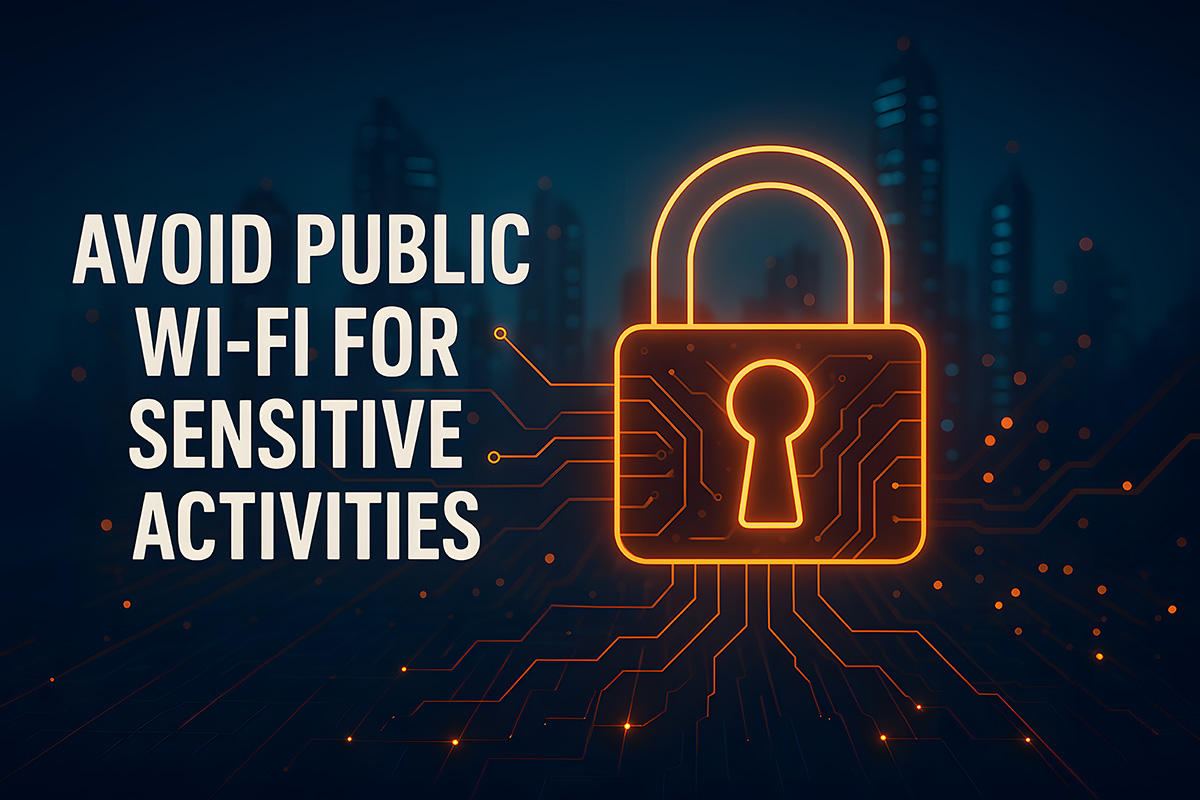Working remotely from coffee shops, airports, and hotels has become the norm for many businesses. While public Wi-Fi makes it easy to stay connected, it also opens the door to one of the most common — and preventable — security risks.
Public Wi-Fi is not secure by default. Without proper precautions, your emails, passwords, client files, and sensitive business data could be exposed to anyone else connected to the same network.
In this post, we’ll break down the top risks of using public Wi-Fi for business and explain how to secure your remote work environment.
🚩 The Top Threats of Public Wi-Fi
1️. Man-in-the-Middle (MITM) Attacks
When you use an unsecured public Wi-Fi network, attackers can place themselves between your device and the network, intercepting your data as it moves between your laptop and the internet.
✅ Risk Example:
Login credentials for your email, CRM, or bank account are captured by an attacker.
Confidential client information transmitted over the network is intercepted.
2️. Rogue Access Points and Evil Twin Networks
Cybercriminals can set up fake Wi-Fi networks that look like legitimate connections (e.g., “Coffee_Shop_WiFi” or “Hotel_Guest_WiFi”). Once you connect, they can monitor everything you do online.
✅ Risk Example:
You connect to “Free Airport Wi-Fi,” but it’s controlled by a hacker.
Your browser automatically connects to a network with a familiar name, but it’s not the real one.
3️. Malware Injection
Some attackers use compromised public Wi-Fi to inject malware directly onto your device — including ransomware, keyloggers, or spyware that can harvest passwords or monitor your activity.
✅ Risk Example:
Malware is silently installed on your laptop through an unsecured connection.
Your system becomes part of a botnet without your knowledge.
4️.Unencrypted Connections
If websites or apps you use don’t enforce HTTPS encryption, your data (like usernames, passwords, and messages) could be transmitted in clear text, making it easy to steal.
✅ Risk Example:
Sensitive files shared over insecure apps are easily viewed or copied by an attacker.
Cloud services accessed without secure encryption leak data unknowingly.
🛡️ How to Protect Your Business Data on Public Wi-Fi
The good news is that these risks are preventable. Here’s your action plan to stay safe when using public Wi-Fi.
✅ 1. Always Use a VPN (Virtual Private Network)
A VPN encrypts all your internet traffic, making it unreadable to hackers — even on unsecured networks.
Use business-grade VPN services (not free VPNs, which may introduce their own risks).
Ensure all remote employees use VPNs when connecting outside the office.
At Cytek, we offer Managed VPN-as-a-Service with device onboarding and user management.
✅ 2. Enable Multi-Factor Authentication (MFA) Everywhere
If an attacker does capture your login credentials, MFA can stop them from logging in.
Require MFA on email accounts, cloud services, and VPN access.
Use authenticator apps instead of SMS codes for stronger protection.
✅ 3. Stick to Secure Websites (HTTPS)
Check for the lock icon in your browser before entering sensitive information.
Use browser extensions like HTTPS Everywhere to force secure connections when available.
Avoid logging into critical accounts over public Wi-Fi without a VPN.
✅ 4. Disable Auto-Connect to Public Networks
Turn off auto-join for Wi-Fi networks on your laptop and mobile devices.
Always verify the correct network name with the business before connecting.
Forget networks you no longer use.
✅ 5. Use Mobile Hotspots as a Safer Alternative
When possible, use a cellular hotspot instead of public Wi-Fi. Mobile data networks are generally more secure than shared Wi-Fi.
✅ 6. Keep Devices Updated and Secure
Install software updates and security patches regularly.
Use Next-Gen Antivirus/EDR solutions that detect unusual activity.
Disable file sharing and network discovery when on public networks.
🧰 How Cytek Helps Keep Your Remote Team Secure
Cytek provides remote work security solutions designed for small businesses, including:
Managed VPN setup and monitoring
Endpoint Detection and Response (EDR) deployment
Mobile device security policy enforcement
Phishing prevention training for employees
Secure file sharing and cloud access controls
🚀 Work Remotely Without Risk
Your team shouldn’t have to choose between convenience and security. With the right protections in place, you can enjoy the flexibility of remote work without exposing your business to unnecessary risks.
🔵 Contact Cytek today for a free consultation on remote work security and VPN setup.

